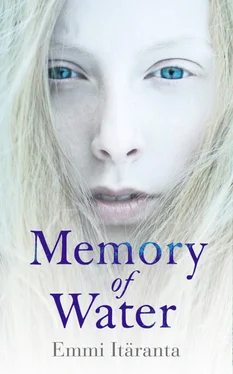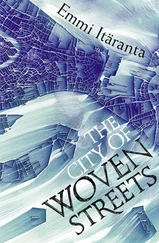Wind rose and died down again. Hidden waters moved in the silence of the earth. Shadows changed their shapes slowly.
Eventually I saw movement on the road, and little by little I began to make out two blue-clad figures in a helicarriage driven by a third one. When they reached the edge of the trees, I hit the large wind chime hanging from the pine. A moment later I heard three chinks from the direction of the teahouse and knew that my father was ready to receive the guests.
The helicarriage stopped near the gate in the shadow of a seagrass roof built for guest vehicles and two men in the military uniforms of New Qian stepped down from it. I recognised the older one: his name was Bolin, a regular tea guest who came every few months all the way from the city of Kuusamo and always paid well in water and goods. My father appreciated him because he knew the etiquette of tea ceremony and never demanded special treatment despite his status. He was also familiar with the local customs, being originally from our village. He was a high-ranked official and the ruling military governor of New Qian in the occupied areas of the Scandinavian Union. His jacket carried insignia in the shape of a small silver fish.
The other guest I had not seen before. From the two silvery fish tagged on his uniform I understood that he was of even higher rank than Bolin. Even before I saw his face through the thin veil of the insect hood, his posture and movements gave me the impression that he was the younger of the two. I bowed and waited for them to bow back in response. Then I turned to the garden path. I walked ahead of them at a deliberately slow pace in order to give them time to descend into the unhurried silence of the ceremony.
The grass at the front of the teahouse shimmered in the sun: my father had sprinkled it with water as a symbol of purity, as was the custom. I washed my hands in the stone basin which I had filled before, and the guests followed my example. Then they sat down on the bench to wait. A moment later a bell chimed inside the teahouse. I slid the door of the guest entrance to the side and invited the guests to move inside. Bolin kneeled at the low entrance with some difficulty, then crawled through it. The younger officer stopped and looked at me. His eyes seemed black and hard behind the insect hood.
‘Is this the only entrance?’ he asked.
‘There is another one for the tea master, sir, but guests never use it.’ I bowed to him.
‘In cities one hardly finds tea masters anymore who require their guests to kneel when entering,’ he replied.
‘This is an old teahouse, sir,’ I said. ‘It was built to follow the old idea that tea belongs to everyone equally, and therefore everyone equally kneels before the ceremony.’ This time I didn’t bow, and I thought I saw annoyance on his face before his expression settled into an unmoving polite smile. He said no more, but dropped down on his knees and went through the entrance into the teahouse. I followed him and slid the door closed behind me. My fingers trembled lightly against the wooden frame. I hoped no one would notice it.
The older guest had already settled by the adjacent wall and the younger one sat down next to him. I sat down by the guest entrance. My father was sitting on his knees opposite to the guests, and as soon as we had removed our insect hoods, he bowed.
‘Welcome, Major Bolin. This is a long-awaited pleasure. Too much water has flown since you last visited us.’ He was keeping strictly to the etiquette, but I could hear a slight warmth in his voice, only reserved for friends and longtime customers.
Major Bolin bowed in response.
‘Master Kaitio, I take pleasure in finding myself in your teahouse again. I have brought a guest with me, and I hope he will enjoy your tea as much as I do.’ He turned to his companion. ‘This is Commander Taro. He has only just moved here from a faraway southern province of New Qian, and I wished to welcome him by treating him to the best tea in the Scandinavian Union.’
Now that he wasn’t wearing his insect hood I could see clearly that Taro was younger than Bolin. His face was smooth and there was no grey in his black hair. The expression on his face did not change when he bowed his greeting.
After my father had welcomed Taro with another bow, he went into the water room and returned shortly carrying a cauldron. He placed it into the hearth in the floor on top of dried peat, which he lit with a firestarter. The flintstones crackled against each other. I listened to the rustling of his clothes as he went into the water room again and returned with a wooden tray laden with two teacups and two teapots, a large metal one and a small earthenware one. He placed the tray next to the hearth on the floor and chose his own place so that he could see the water in the cauldron. I knew Major Bolin to favour green tea that required the water not to be too hot. ‘When you can count ten small bubbles at the bottom of the cauldron, it is time to raise the water into the teapot,’ my father had taught me. ‘Five is too few and twenty is too many.’
When the water had reached the right temperature, my father scooped some of it from the cauldron into the large teapot. As a child I had followed his movements and tried to imitate them in front of a mirror until my arms, neck and back ached. I never reached the same smooth, unrestrained flow that I saw in him: he was like a tree bending in wind or a strand of hair floating in water. My own movements seemed clumsy and rigid compared to his. ‘You’re trying to copy the external movement,’ he would say then. ‘The flow must come from the inside and pass through you relentlessly, unstopping, like breathing or life.’
It was only after I began to think about water that I began to understand what he meant.
Water has no beginning and no end, and the tea master’s movement as he prepares the tea doesn’t have them, either. Every silence, every stillness is a part of the current, and if it seems to cease, it’s only because human senses aren’t sufficient to perceive it. The flow merely grows and fades and changes, like water in the iron cauldron, like life.
When I realised this, my movements began to shift, leaving the surface of my skin and my tense muscles for a deeper place inside.
My father poured water from the large teapot into the smaller one, which held the tea leaves. Then he poured this mild, swiftly brewed tea from the smaller pot into the cups in order to warm them up. As a final step of preparation, he filled the small teapot again and drenched it with the tea from the cups, soaking the earthenware sides of the pot while the leaves inside were releasing their flavour. The blaze lanterns hanging from the ceiling sprinkled softly flickering light on the water as it spread on the tray. Breath by breath I let myself sink into the ceremony and took in the sensations around me: the flare of the yellowish light, the sweet, grassy scent of the tea, the crinkle in the fabric of my trousers pressing at my leg, the wet clank of the metal teapot when my father placed it on the tray. They all entwined and merged into one stream that breathed through me, chasing the blood in my veins, drawing me closer and deeper into the moment, until I felt as if I wasn’t the one breathing anymore, but life itself was breathing through me, connecting me to the sky above and earth below.
And then the flow was cut short.
‘Some might say that is quite a waste of water.’ The words were spoken by Commander Taro. His voice was low and surprisingly soft. I had trouble imagining anyone commanding armies with such a voice. ‘It’s rare to find anyone these days who can afford to spend water on a complete, unabridged tea ceremony,’ Taro continued.
Although I wasn’t looking at my father, I could sense that he had frozen, as if an invisible web had tightened under his skin.
Читать дальше
Конец ознакомительного отрывка
Купить книгу












